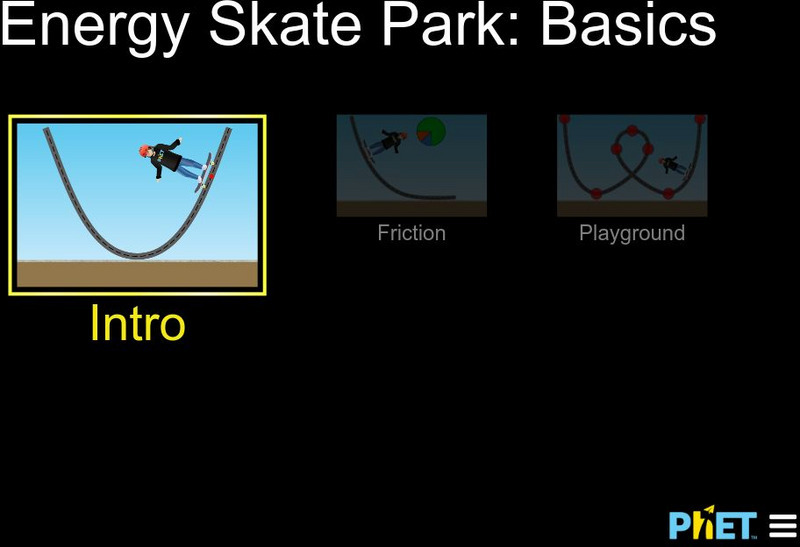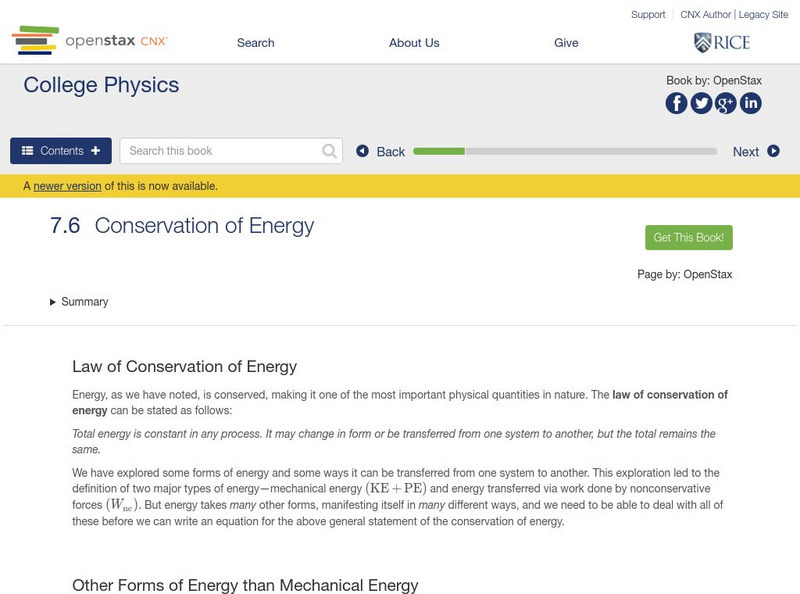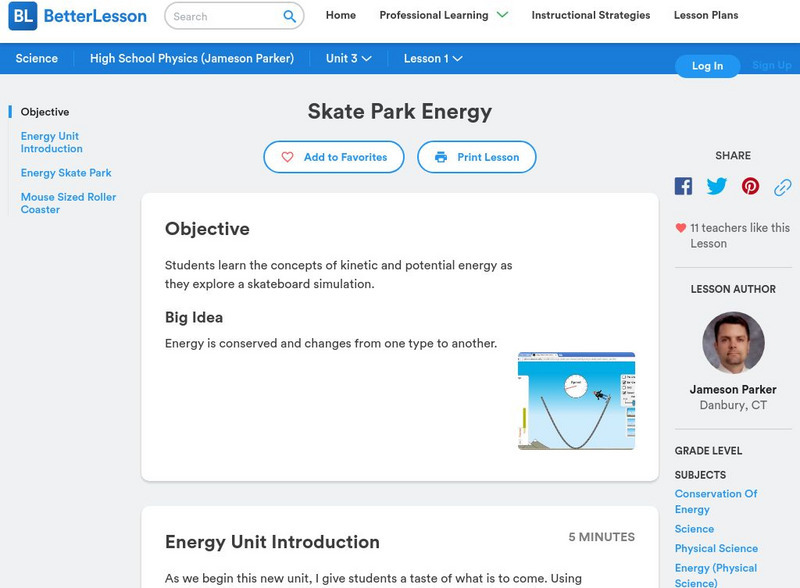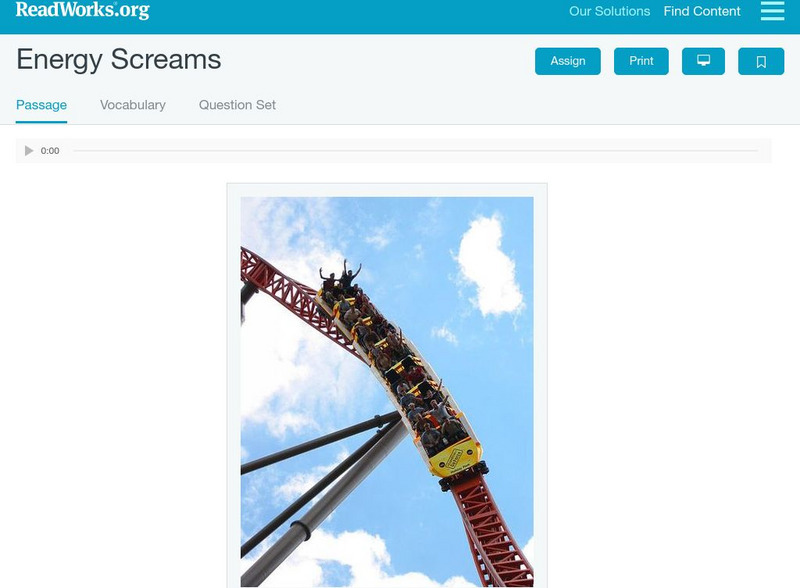Science Education Resource Center at Carleton College
Serc: Launching a Ping Pong Ball With a Dropper Popper
An activity where students demonstrate elastic potential energy and gravitational potential energy by looking at the travel height of a ping pong when dropped vs a ping pong dropped with a "dropper popper".
Other
Bc Open Textbooks: Energy and the Simple Harmonic Oscillator
This resource examines how to determine the maximum speed of an oscillating system. It discusses how the concept of law of energy can be applied in solving these types of problems.
University of Colorado
University of Colorado: Ph Et Interactive Simulations: Energy Skate Park
Explore kinetic, potential, and thermal energy as you send a skateboarder along several pre-built tracks, then design your own. Charts and graphs show the distribution of the different forms of energy, illustrating how the total energy...
eSchool Today
E School Today: Energy
Explains different kinds of energy, covering kinetic, potential, gravitational, mechanical, sound, thermal, chemical, electrical, and radiant energy. Also looks at storage, transfer, and dissipation of energy. Includes a short...
OpenStax
Open Stax: Conservation of Energy
In the following tutorial, students will learn about the law of conservation of energy. They will read about some of the many forms of energy. They will understand the definition of efficiency of an energy conversion process as the...
TeachEngineering
Teach Engineering: The Car With a Lot of Potential
Working in teams, students perform quantitative observational experiments on the motion of LEGO MINDSTORMS NXT robotic vehicles powered by the stored potential energy of rubber bands. Students understand that through the manipulation of...
TeachEngineering
Teach Engineering: Energy
Through nine lessons, students are introduced to a range of energy types--electrical, light, sound and thermal-as well as the renewable energy sources of wind, hydro (water) and solar power. Subjects range from understanding that the...
Annenberg Foundation
Annenberg Learner: Science in Focus: Energy: Energy in Food
A video workshop examining how the Sun provides energy for all living things beginning with the process of photosynthesis. Presents current scientific thinking about energy transfer through the food chain as well as ways to deal with...
Physics Classroom
The Physics Classroom: The Work Energy Theorem
This page explores the quantitative relationship between work and mechanical energy in situations in which there are no external forces doing work. It is a basic analysis of situations in which mechanical energy is conserved. Examples...
University of Colorado
University of Colorado: Ph Et Interactive Simulations: Energy Skate Park
Build tracks, ramps and jumps in a skate park to learn about energy.
Texas Education Agency
Texas Gateway: Ready for an Energy Makeover?
Sometimes these are changes that happen routinely in the natural world, and sometimes these are "makeovers" where human creations transform energy into a specific form that serves a specific need. Either way, we call these changes energy...
Better Lesson
Better Lesson: Skate Park Energy
Using computer simulation, young scholars will explore the concept of conservation of energy at a skate park. After the completion of that exercise, students will move to a worksheet about the concepts with a roller coaster. Site...
FT Exploring
Ft Exploring: What Type of Energy Is It?
How many types of energy are there? Are there many forms of energy, such as electrical, mechanical, and chemical? Or are there really just two types of energy - kinetic energy and potential energy? Here you can learn about these...
Physics Classroom
The Physics Classroom: Electric Potential
This tutorial introduces the concept of electric potential. It relates this concept to the potential energy of a positive test charge at various locations within an electric field. Take the interactive quiz to test your understanding.
Sophia Learning
Sophia: Transfer of Energy: Lesson 1
This lesson explains the difference between the types of energy, including Potential Energy and Kinetic Energy. It is 1 of 2 in the series titled "Transfer of Energy."
Open Curriculum
Open Curriculum: Simplifying the Energy Zoo
Physics students find out how to effectively define and clarify kinetic and potential energy.
Read Works
Read Works: Energy Screams
[Free Registration/Login Required] An informational text about potential and kinetic energy on a roller coaster.. A question sheet is available to help students build skills in reading comprehension.
Concord Consortium
Concord Consortium Where Does the Energy of a Spark Come From?
Students define potential energy and explore the relationship between potential energy and field. How does potential energy change when things are pushed or pulled? Where does the energy that was used to charge the Van de Graaff...
E-learning for Kids
E Learning for Kids: Science: Pirates: What Is Energy Conversion?
This lesson covers the different types of energy, the definitions of kinetic and potential energy, how energy can be converted into different forms, and the law of conservation of energy.
Science Education Resource Center at Carleton College
Serc: Maximizing Kinetic Energy: An Investigation Using Marbles
Using marbles to construct a marble run, students will learn about projectile motion, kinetic energy, potential energy, final velocity, and forces.
Concord Consortium
Concord Consortium Where Does the Energy of a Spark Come From?
Activity 2 of the module investigates Where does the energy used to charge the Van de Graaff generator go? The activity investigates how objects can interact without touching, as well as what happens to potential energy when objects...
Concord Consortium
Concord Consortium Where Does the Energy of a Spark Come From?
Activity 3 investigates Why is lightning so much bigger that a spark from the Van de Graff generator? In Activity 3 of this module, students investigate factors that affect the amount of potential energy that is stored.
Concord Consortium
Concord Consortium: Where Does the Energy of a Spark Come From?
Activity 4 of this module investigates Why do I get shocked if I am too close to the Van de Graaff generator? This activity explores what happens to the potential energy of a system when objects are allowed to move freely (not held in...
Science Struck
Science Struck: Chemical Potential Energy: Definition and Examples
Explains what potential energy and chemical potential energy are and gives examples of the latter.
Other popular searches
- Kinetic and Potential Energy
- Potential Energy Diagram
- Gravitational Potential Energy
- Kinetic Potential Energy
- Elastic Potential Energy
- Calculating Potential Energy
- Physics Potential Energy
- Potential Energy Pendulum
- Kinetic vs. Potential Energy
- Forms of Potential Energy
- Potential Energy and Water
- Kinetic vs Potential Energy


















